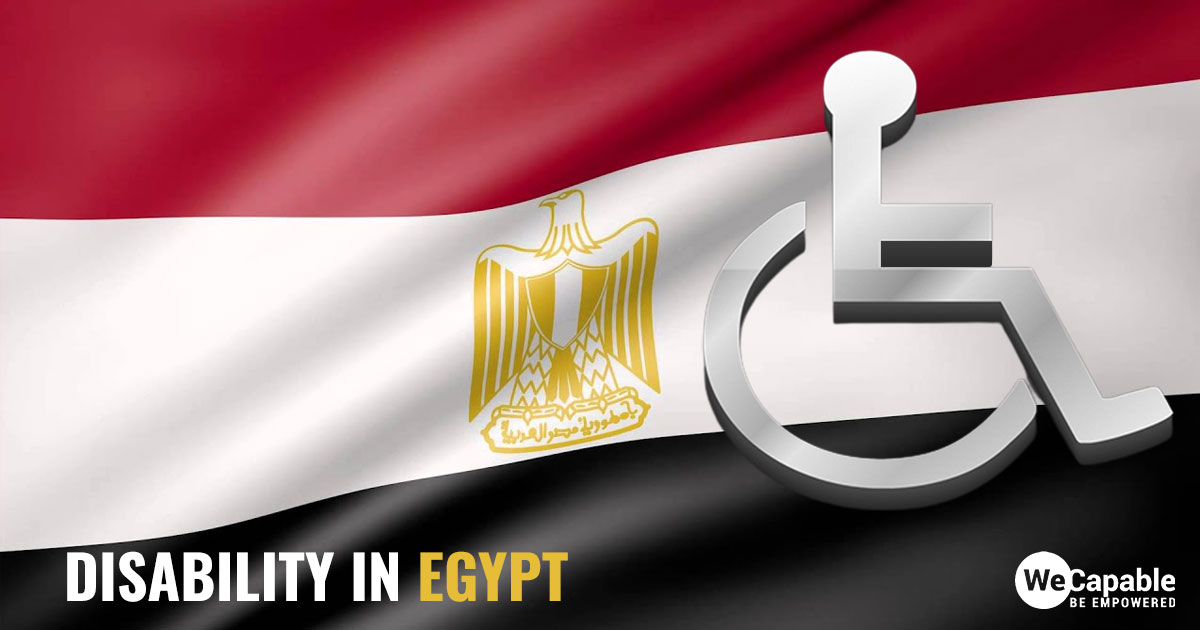Egypt, a transcontinental country, houses one of the oldest civilizations on Earth.
Civilization, if you believe anthropologist Margaret Mead, begins with a broken femur that has healed because someone cared for the person with the broken femur long enough for it to be cured.
Any society can be called a civilized society when the society learns to care for those who are physically or mentally not as able as the general population.
Let us see how civilized is the society of Egypt for those people living with a disability by examining its laws and other determining factors like the social status of people with disabilities in Egypt.
Definition of Disability in Egypt
Egypt’s Rehabilitation Law defines a person with disability as any individual can be considered to be disabled if they become unable to depend on themselves for their own work and remains in that condition. The inability to do their tasks may be a result of physical, mental, sensory or congenital impairment.
We can see that the definition of disability focuses mainly on the inability to perform tasks of daily needs due to any impairment. We can conclude that result is more important than the reason of impairment according to the disability definition given by the Rehabilitation Law of Egypt.
Disability Facts and Statistics in Egypt
Although the 2006 Egyptian census estimates that only 1.4 million Egyptian people are inflicted with a disability. However, the UN reports show a much higher figure. According to the reports of the United Nations Development Programme (UNDP), approximately 12 million people in Egypt are inflicted with one or the other disability. The report further states that as the disability affects the entire family rather than the individual, 36 million people can be estimated to be affected with disability.
Some reports have shown that 18% among the poorest 20% of Egyptians are inflicted with disability. This shows a clear correlation between poverty and disability in Egypt.

The rate of unemployment among the disabled population too is significantly high according to the latest survey conducted in 2018. The rate of illiteracy too shows a similar figure. The incidence of poverty, hunger, unemployment and illiteracy is much higher in disabled females as compared to their male counterparts.
It is worth noting that the major causes of disability or impairment in Egypt are avoidable. The causes include poverty, unsanitary living condition and malnutrition. Endogamous marriage practice prevalent in Egyptian society too is seen as one of the important factors causing disability.
Laws and Legislation Regarding Disability in Egypt
The United Nations Convention on the Rights of Persons with Disabilities was ratified by Egypt on 14 April 2008.
1. The Constitution of Egypt, 2014 – The current constitution of Egypt was approved and implemented in 2014. Several articles of the constitution relate directly or indirectly to disability. Article 81, for example, states that the state shall guarantee health, economic, social, cultural, entertainment, sporting and educational rights to persons with disabilities. The law further makes it obligatory for the government to provide job opportunities to people with disabilities and to accommodate the public facilities according to the special needs of persons with disabilities.
2. The Rehabilitation Law – The law makes an employment quota of 5% for people with disabilities. The private sector is bound to create a quota of 5% for PwDs failing which they will be fined by the competent authorities.
3. Law No. 10, 2018 – This new law regarding disability covers many aspects of human rights for persons with disabilities. It includes the law against any discrimination based on disability or gender of the person with a disability. The law intends to create equality for persons with disabilities in a real sense. It also provides the right to get proper information for persons with disabilities as well as their families from all the sectors related to the rights of persons with disabilities.
Social Status of Persons with Disabilities in Egypt
Though the laws are following the international norms, social stigma and stereotypes against disability are very strong in Egypt. People in the country still believe that disabilities like blindness, Down Syndrome, Cerebral Palsy are all forms of divine punishments inflicted on the sinners.
According to a report published in 2010, Egyptians are so embarrassed in accepting disability that they hide their disabled family members even from their neighbors. Even when the law guarantees the right to equality, social stigma restricts persons with disabilities even from participating in society. We hope the situation changes soon for the better.
Use the citation below to add this article to your bibliography
"Disability in Egypt: Definition, Laws, Statistics, Social Stigma and Discrimination." Wecapable.com. Web. June 14, 2025. <https://wecapable.com/disability-in-egypt-definition-laws-statistics-social-stigma-discrimination/>
Wecapable.com, "Disability in Egypt: Definition, Laws, Statistics, Social Stigma and Discrimination." Accessed June 14, 2025. https://wecapable.com/disability-in-egypt-definition-laws-statistics-social-stigma-discrimination/
"Disability in Egypt: Definition, Laws, Statistics, Social Stigma and Discrimination." (n.d.). Wecapable.com. Retrieved June 14, 2025 from https://wecapable.com/disability-in-egypt-definition-laws-statistics-social-stigma-discrimination/

Leave a Reply